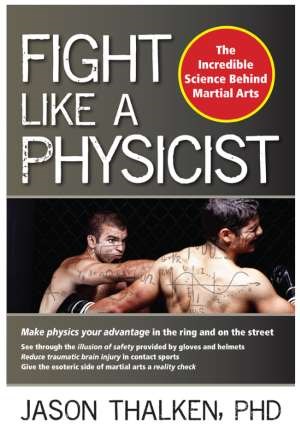A while ago, I read the book “Fight Like a Physicist: The Incredible Science Behind Martial Arts” by Jason Thalken. I read it mostly because it received such rave reviews. Several people I know also recommended it to me, so I decided to buy it and give it a try. I have a particular interest in the physics of martial arts and conditioning, so I was eager to start reading.
The book has several sections and first talks about basics like center of mass, energy, momentum and glancing blows.
The second section is slightly different and covers protecting yourself with knowledge. It dives deeper into the mechanics of a knockout and how it damages your brain both in the short and in the long term. There is also a piece about how safety equipment works and how it can be improved.
Both these sections are interesting and I don’t really have any issues with them. The main negative point is that they are all rather basic. If you have trained for several years in the martial arts, you have probably heard of these concepts before or have studied them. The odds are good that you therefore already have a good working knowledge and the book doesn’t necessarily give you much more information. So I would look at it as a basic primer as opposed to an in-depth study.
 The second section is slightly problematic. Once again the first few chapters are relatively basic and don’t offer knowledge that isn’t freely available elsewhere. However, I take issue with the two final chapters.
The second section is slightly problematic. Once again the first few chapters are relatively basic and don’t offer knowledge that isn’t freely available elsewhere. However, I take issue with the two final chapters.
First, there’s a part about guns, knives and the “Hollywood Death Sentence.” Though the author gives some basic information, he tends to put things in extremes as opposed to add nuance to the debate. The chapter about chi and pseudoscience in the martial arts also shows a limited understanding of Chinese martial arts. For sure, there is fake mysticism involved, but the practice is not by definition useless, despite the misgivings of the author.
If it sounds like I’m harshly criticizing this book, that is not my intent. Mostly I’m just disappointed because I expected more from the book. Perhaps you will find it more useful and interesting than I did, I sincerely hope so.
Conclusion
This book is great for beginners and if you haven’t really given the physics part of the martial arts and self-defense systems much thought. In that case, it is a good introduction to this topic. If you already have a solid working knowledge, then I would suggest waiting for another one to come along with more in-depth and nuanced information.
This review was first published in my Patreon newsletter of September 2017, available at Yellow Belt and up.


Leave a Reply